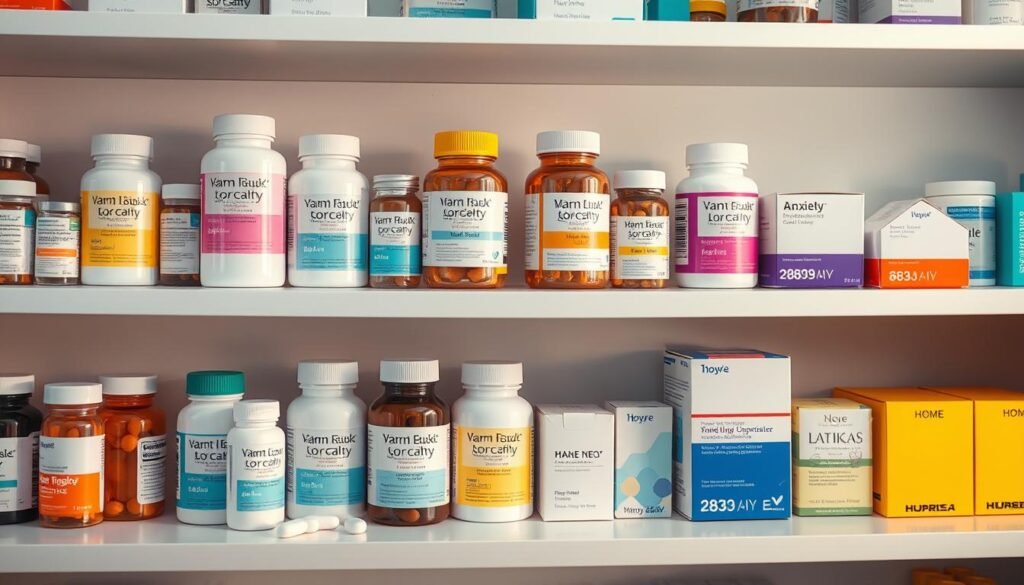About one in four people might react badly to anxiety and depression medicine. This shows how hard it is to find the best drug for each person. Anxiety and depression are more common now, especially among young people. It’s very important to find the right medicine that works well and has few side effects.
This article talks about different treatments for anxiety and depression. These include famous antidepressants and additional therapies. Using both medicine and changing your lifestyle is key. If you’re dealing with a lot of anxiety or depression, talk to a doctor for advice. For more info on handling anxiety, go to WebMD.
Key Takeaways
- Antidepressants aim to lessen symptoms, not cure them.
- Effective treatment often means trying several drugs.
- SSRIs are a top choice because they have fewer side effects.
- Mixing medicines with therapy works better overall.
- Seeing your doctor often to tweak treatment is crucial.
Understanding Anxiety and Depression
Anxiety and depression affect millions worldwide. Anxiety shows up as worry, fear, and feeling restless. Depression appears through sadness, no hope, and changes in eating or sleeping. It’s important to know about these conditions because they often occur together and make treatment complex.
Symptoms of Anxiety and Depression
Anxiety’s symptoms can make everyday tasks hard. They include:
- Restlessness
- Fatigue
- Difficulty concentrating
- Irritability
Depression can show itself by:
- Low mood
- Fatigue
- Changes in appetite
- Sleep disturbances
- Feelings of worthlessness
Recognizing symptoms helps people find the right help. The WHO says about 5% of adults globally suffer from depression. This shows it’s a major issue.
In the U.S., anxiety disorders impact around 40 million adults each year. They’re the most common mental health condition in the nation. Understanding how anxiety and depression overlap is key. Almost half of those with depression will also face anxiety. Treatments like psychotherapy and medication can really help. They deal with both conditions at once. For more info on handling these issues, here’s a good link about medications for anxiety and depression.
Prevalence of Anxiety and Depression in the United States
In the U.S., anxiety and depression levels have grown concerning. Around 51.5 million adults face mental illness. This equals about 20.6% of all adults. Women report more cases with 24.5% suffering compared to 16.3% among men. For young adults aged 18–24, the rate hits 29.4%.
Many people are facing anxiety and depression, and it affects different groups in unique ways. Women often seek more help, with 25.6% looking for treatment in 2020 versus 14.6% of men. About 15 million adults have social anxiety disorder, and 6.8 million face generalized anxiety disorder. About 43.2% of GAD sufferers are getting help.
The COVID-19 pandemic made mental health struggles worse. Financial stress tripled symptoms for many. This shows we need to tackle the prevalence of anxiety and depression more. Right now, over 13.3 million adults feel they’re not getting the mental health care they need.
The table below shows how many adults sought mental health treatment over the past year:
| Demographic Group | Percentage Seeking Treatment |
|---|---|
| Females | 25.6% |
| Males | 14.6% |
| Non-Hispanic Whites | 24.4% |
| Non-Hispanic Blacks | 15.3% |
| Hispanics | 12.6% |
| Non-Hispanic Asians | 7.7% |
We see key areas needing research to improve mental health care. Exploring new medicines and bettering care access is vital. To dive deeper into new treatments, look into novel pharmacotherapeutic agents. They could change how we address anxiety and depression.
How Medications Help Manage Anxiety and Depression
Medication is key for managing anxiety and depression. It works well with therapy and lifestyle changes. These medicines aim to reduce symptoms and improve life quality for those with these issues.
Knowing how medications work is important for treatment decisions. Antidepressants and anti-anxiety meds help balance brain chemicals, like serotonin. SSRIs, which boost serotonin, can help with mood, eating, and sleep. Drugs like escitalopram, fluoxetine, paroxetine, and sertraline are common SSRIs for anxiety.
SSRIs may take 4 to 6 weeks to work, but benzodiazepines act faster. Yet, benzodiazepines can be addictive over time. They are usually prescribed for no more than one year. You might feel drowsy, confused, or get headaches.
Many see improvements with antidepressants after starting early. Full benefits can appear in 6 to 12 weeks. Dose changes are often needed to find the right balance with few side effects. This shows the need for a personalized treatment plan.
There are other options like TCAs and MAOIs, but they’re less common due to side effects. Understanding these medicines is key to choosing the best mental health treatment.
Types of Medications for Anxiety and Depression
Knowing the different types of medications for anxiety and depression helps people find the right treatment. There are various medications each designed for specific symptoms. The main categories include:
- Selective Serotonin Reuptake Inhibitors (SSRIs): These often start the treatment for anxiety disorders, like Generalized Anxiety Disorder (GAD). They begin to work within 2–6 weeks. However, commitment is needed for 6–12 months. About 20-60% of patients report side effects, so monitoring is key.
- Serotonin-Norepinephrine Reuptake Inhibitors (SNRIs): These are also top choices for treating anxiety. They might not work as well for OCD though. Venlafaxine and duloxetine are common SNRIs, which sometimes cause stomach issues or weight gain.
- Benzodiazepines: They offer quick relief for severe anxiety but can lead to dependence if used long-term. The FDA has warned about their risks, including misuse and addiction.
- Tricyclic Antidepressants (TCAs): If SSRIs or SNRIs don’t work, TCAs may be tried. They’re effective but can have more serious side effects like orthostatic hypotension and dry mouth.

When comparing medicines for anxiety and depression, SSRIs and SNRIs are found to be about 60-70% effective. This makes them popular in treatment plans today. Still, 30% of people with anxiety disorders might need different treatments if these don’t work. Pairing medication with Cognitive Behavioral Therapy (CBT) is effective for about half of the patients. This variety of options shows the wide range of treatments available for personal needs in managing anxiety and depression.
| Medication Type | Effectiveness | Common Side Effects | Typical Duration |
|---|---|---|---|
| SSRIs | 60-70% | Headache, nausea, sexual dysfunction | 6-12 months |
| SNRIs | Similar to SSRIs | Insomnia, weight gain | 6-12 months |
| Benzodiazepines | Effective for short-term | Dependence, drowsiness | Short-term use recommended |
| TCAs | When SSRIs ineffective | Orthostatic hypotension, dry mouth | Varies based on response |
Selective Serotonin Reuptake Inhibitors (SSRIs)
SSRIs are often chosen first for tackling anxiety and depression. They work by upping serotonin levels in the brain. This can ease symptoms of various mental health issues. It usually takes 2 to 4 weeks for the benefits to show, which means being patient is key when starting.
Common SSRIs Prescribed
In the United States, some well-known SSRIs are:
- Fluoxetine (Prozac)
- Escitalopram (Lexapro)
- Sertraline (Zoloft)
- Citalopram (Celexa)
- Paroxetine (Paxil)
SSRIs help with severe anxiety symptoms. They are considered top options for anxiety and depression. This is because they tend to have fewer side effects than other antidepressants. The starting doses are usually low. Dosages can be adjusted as needed.
Side Effects of SSRIs
SSRIs do a good job at managing anxiety and depression. But, they can have side effects. Some common issues include:
- Nausea and stomach problems
- Feeling more anxious or agitated
- Dizziness
- Trouble sleeping
- Sex drive loss and erectile issues
- Young people under 25 may have a higher suicide risk
Talking regularly with a healthcare provider is important. This is especially true in the first few weeks. If stopping SSRIs, it’s best to slowly lower the dose. A doctor can guide this to lessen withdrawal chances.
Serotonin-Norepinephrine Reuptake Inhibitors (SNRIs)
SNRIs are key for treating anxiety and depression. They boost serotonin and norepinephrine levels in our brains. This helps better mood and emotional control. Knowing their value in treating these conditions is key, offering hope to many looking for relief.
Examples of SNRIs Used
Several SNRIs are approved by the FDA for anxiety and depression. Here are some examples:
- Duloxetine (Cymbalta) – Also indicated for certain chronic pain conditions.
- Venlafaxine (Effexor XR) – Known to raise blood pressure in some patients.
- Desvenlafaxine (Pristiq) – Similar to Effexor, but with varying effects.
- Levomilnacipran (Fetzima) – Primarily approved for major depression.
It may take weeks for these medications to be fully effective. Early side effects often get better with time. Using them with SSRIs might increase benefits. However, they may not always be more effective than SSRIs.
Potential Side Effects of SNRIs
SNRIs can cause side effects. Some common issues are:
| Side Effects | Description |
|---|---|
| Nausea | Often experienced during the early stages of treatment. |
| Insomnia | Some patients struggle with sleep disturbances. |
| Dizziness | A common effect that may diminish over time. |
| Increased blood pressure | Particularly observed with venlafaxine and desvenlafaxine. |
Serious effects like serotonin syndrome are rare but need watching. Symptoms include confusion and fast heart rate. Stopping SNRIs suddenly can cause withdrawal, like flu symptoms and sleep issues. Knowing these side effects helps when discussing treatments with doctors.

Benzodiazepines for Short-Term Relief
Benzodiazepines are antianxiety medications known for their rapid relief. They help with panic attacks and sudden anxiety. About 30.5 million U.S. people got a prescription for them in a year.
For short-term help, these meds work well. They quickly reduce anxiety symptoms. Drugs like alprazolam and lorazepam are used for certain anxiety disorders. They are known for fast relief.
But, they can be habit-forming. Long-term use might lead to addiction and dependence. Tolerance to their sleep effects can also grow quickly. So, doctors usually prescribe them for a short time, like a few weeks.
Even low doses can cause side effects like drowsiness, dizziness, and unsteady movements. High doses might cause confusion or breathing problems. People with a history of substance abuse should be very careful. They have a higher risk of becoming dependent.
| Description | Details |
|---|---|
| Common Uses | Anxiety disorders, panic disorder, alcohol withdrawal, seizures |
| Onset of Action | Minutes to an hour |
| Duration of Effects | Several hours to days (depending on the specific benzodiazepine) |
| Common Side Effects | Drowsiness, dizziness, confusion, impaired balance |
| Risk of Dependency | Higher with long-term use; those with a history of substance abuse at increased risk |
| Recommended Use Duration | Short-term (typically a few weeks) |
| Considerations | Gradual tapering recommended after long-term use |
Benzodiazepines are valuable for severe anxiety. They work fast, but it’s important to use them safely. Knowing the risks helps avoid problems with these meds.
Tricyclic Antidepressants (TCAs)
Tricyclic antidepressants are an old kind of medicine. They help with anxiety and depression. The U.S. Food and Drug Administration (FDA) approves several TCAs. This list includes Amitriptyline, Nortriptyline, and Imipramine. However, doctors don’t use them as much now because of their side effects. Still, they are important for some patients. Especially for those who don’t get better with other medicines.
When are TCAs Prescribed?
Doctors may suggest TCAs when other medicines don’t work. Someone with severe anxiety or depression might try TCAs. These drugs also help with nerve pain and stopping migraines. It’s important to talk to doctors about the good and bad of TCAs.
Common side effects include:
- drowsiness
- blurred vision
- constipation
- dry mouth
- issues with urine passage
Amitriptyline might make you more sleepy than other TCAs. It could also cause weight gain. Nortriptyline and Desipramine usually have fewer bad effects. Stopping TCAs suddenly can cause withdrawal. This feels like restlessness and getting sick.
Understanding TCAs well can make treatment better. It helps many people handle their health issues. For more info on medicine for anxiety and side effects, go to this resource.

Best Medication for Anxiety and Depression
Choosing the right medication for anxiety and depression is very personal. Selective serotonin reuptake inhibitors (SSRIs) and serotonin-norepinephrine reuptake inhibitors (SNRIs) are common starts. Drugs like escitalopram are known to work well. They may take weeks to show their full effect.
Talking to doctors about prescriptions is key. They keep an eye on how well the treatment works. They start with low doses. This is especially important for young people because of possible side effects like suicidal thoughts.
Some well-known SSRIs are:
- Celexa
- Lexapro
- Luvox
- Paxil
- Zoloft
For SNRIs, there are:
- Pristiq
- Cymbalta
- Effexor XR
Keeping track of your health is important due to possible side effects like stomach issues and sexual dysfunction. Always talk to your doctor before stopping any medication.
| Medication Type | Common Brands | General Uses | Monitoring Needs |
|---|---|---|---|
| SSRIs | Celexa, Lexapro, Zoloft | Anxiety, Depression | Regular assessments for side effects |
| SNRIs | Cymbalta, Effexor XR | Anxiety, Major Depressive Disorder | Monitor efficacy and side effects |
| Benzodiazepines | Valium, Xanax | Short-term anxiety relief | Risk of dependence |
Finding the right treatment for anxiety and depression is a team effort. Talking with healthcare providers and reviewing medications are crucial steps. This helps people find the best way to manage their mental health.
Conclusion
Patients dealing with anxiety and depression can find hope. Medications are key, but not the whole picture. A treatment plan often includes therapy, like CBT, for better outcomes.
Choosing the right medication needs teamwork between the patient and doctor. It’s important to know about your symptoms and potential side effects. Being informed helps with treatment success and personal health goals.
Medication is just one part of caring for mental health. A holistic approach also looks at lifestyle changes and different therapies. This leads to better mental health and a happier life.